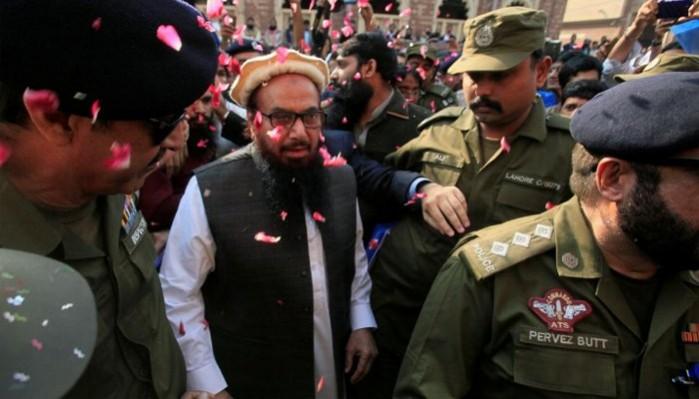The United States on Friday, November 24, said it was "deeply concerned" by the release of Lashkar-e-Taiba (LeT) founder and Jamaat-ud-Dawa (JuD) chief Hafiz Saeed — the man who masterminded the 2008 Mumbai terror attacks that killed hundreds of people, and came to be known as the 26/11 attacks.
US State Department spokesperson Heather Nauert, in a statement released by the US Embassy in Islamabad, said the JuD chief should be "arrested and charged for his crimes."
The statement came the same day as Saeed walked free after remaining under house arrest for around 300 days, and promptly attended a rally populated by known terrorist elements, where he said he would continue to fight for the "cause of Kashmir."

US concerned
Nauert, in her statement, said: "The United States is deeply concerned that Lashkar-e-Tayyiba (LeT) leader Hafiz Seed has been released from house arrest in Pakistan. LeT is a designated Foreign Terrorist Organisation responsible for the death of hundreds of innocent civilians in terrorist attacks, including a number of American citizens. The Pakistani government should make sure that he is arrested and charged for his crimes."
She also said: "In May 2008, the United States Department of the Treasury designated Saeed as a Specially Designated Global Terrorist under Executive Order 13224. Saeed was also individually designated by the United Nations under UNSCR 1267 in December 2008 following the November 2008 Mumbai attack in which six American citizens were killed."
Nauert added in her statement: "LeT and several of its front organizations, leaders, and operatives remain under both State Department and Treasury Department sanctions. Since 2012, the United States has offered a $10-million reward for information that brings Saeed to justice."

Saeed's threats
Hafiz Saeed, against whom India has given Pakistan dossier after dossier documenting his role in fomenting terrorism in Jammu and Kashmir as well as other parts of India, walked free after 10 months of house arrest on Friday because a senior Pakistan finance ministry official "failed to convince" a board reviewing the need to extend the house arrest that "the release of Saeed would bring diplomatic and financial problems to the country," according to a Dawn report.
Saeed and his accomplices Abdullah Ubaid, Malik Zafar Iqbal, Abdul Rehman Abid and Qazi Kashif Hussain were detained by the Punjab government on January 31 this year under the Anti-Terrorism Act, 1997.
However, as soon as he walked out on Friday, the JuD chief took to posturing against India, saying: "I was detained for 10 months only to stop my voice for Kashmir. I fight the case of Kashmiris. I will gather the people from across the country for the cause of Kashmir. And we will try to help Kashmiris get their destination of freedom."









!['Had denied Housefull franchise as they wanted me to wear a bikini': Tia Bajpai on turning down bold scripts [Exclusive]](https://data1.ibtimes.co.in/en/full/806605/had-denied-housefull-franchise-they-wanted-me-wear-bikini-tia-bajpai-turning-down-bold.png?w=220&h=138)



